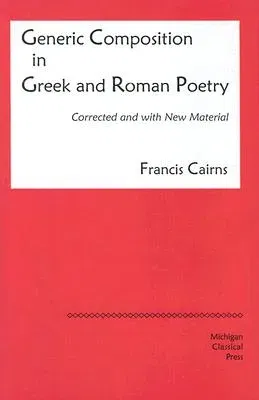Original in conception and powerful in scope, Generic Composition in
Greek and Roman Poetry remains one of the most important books on early
Greek, Hellenistic and Roman poetry in a generation. First published in
the philological climate of the early 1970s, Francis Cairns' book was
among the first works that sought to further our comprehension of
difficult or obscure ancient poems by applying new literary-critical
conventions and terminology, notably the concept of genre. Ancient
literary studies have grown more sophisticated over the last years, and
Generic Composition in Greek and Roman Poetry now finds itself very much
in the midst of current debates. The new edition includes a new
Postscript by the author, and important corrections to the text, notes,
and indices.
The original publisher remarked, "This is the first serious attempt to
formulate a system of literary criticism for ancient poetry, derived
wholly from ancient evidence. It is based on methods of generic
analysis, assignment and interpretation applicable to all Greek and
Roman poetry. It outlines what the author deduces are the creative
principles informing ancient poets' approach to their subject matter,
and establishes criteria that enable an objective discussion of the
poems' originality and merit."
Generic Composition in Greek and Roman Poetry examines uses of topoi and
categories of genres, and offers detailed and insightful interpretations
of many individual poems in both languages. It also highlights five
specific generic sophistications, among them inversion and inclusion.
The work is accompanied by extensive notes and indices, together with
translations of the original texts that make it accessible and valuable
to classicists and non-classicists alike.
One of the great contributions of Francis Cairns' work has been firmly
to move the study of ancient poetry away from the realm of fictive
literary biography, while grounding critical analysis in the techniques
that were employed by ancient authors to create meaning.

